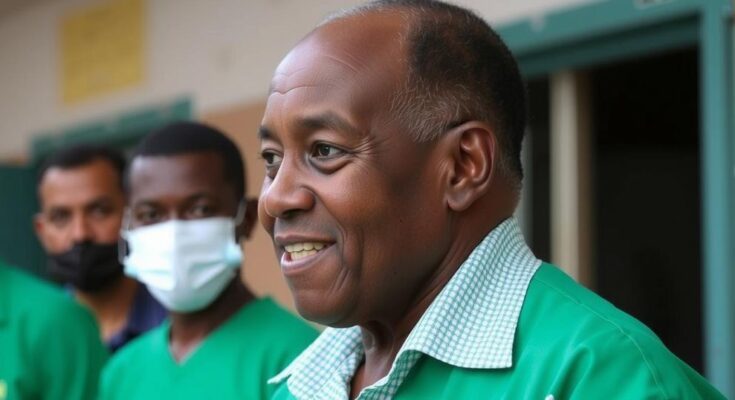Comoros recently held elections for lawmakers amidst boycott by opposition groups citing lack of transparency. Nour El-Fath Azali, son of President Azali Assoumani, is contesting for a seat. The elections faced criticism over logistical issues and voter privacy concerns. The ruling CRC party is anticipated to maintain parliamentary dominance, perpetuating political uncertainty in the island nation.
On Sunday, the Indian Ocean island nation of Comoros conducted elections to choose new lawmakers, although many opposition factions declared their intention to boycott the polls, alleging a lack of transparency in the electoral process. Nour El-Fath Azali, aged 39 and the secretary general of Comoros, is contesting for a parliamentary seat just outside the capital, Moroni. Reports indicated that several polling stations opened late due to logistical issues, such as materials arriving tardily, which further called into question the integrity of the election administration.
Concerns regarding voter privacy were voiced by observers, with one booth reportedly being improvised with basic materials, thereby compromising the anonymity of the voting process. Nour Azali, who is the son of President Azali Assoumani, was appointed to a significant role in July 2024, effectively functioning as a de facto prime minister by having the authority to approve decrees from ministers and governors.
The opposition’s participation this year aimed to prevent a repeat of the 2020 legislative elections, which were boycotted and allowed the ruling Convention for the Renewal of the Comoros (CRC) party to dominate uncontested. Despite promises from the President for a constructive opposition, the credibility of the election process has been tainted by past allegations of fraud, particularly surrounding Azali’s re-election in January 2024.
In a recent statement after casting his vote, President Azali expressed relief that the campaign had proceeded without unrest despite adverse weather conditions. Yet, the implementation of these elections is facing severe scrutiny, particularly regarding the lack of oversight and potential voter suppression, as indicated by the experience of one voter who complained about inadequate ink for marking ballots. In total, thirty-three parliamentary positions are at stake, with approximately 340,000 registered voters eligible to participate in this two-round election, which will culminate on February 16, 2024. The majority of political analysts predict a significant win for the CRC, given that many constituencies face no opposition.
The political landscape in Comoros has been increasingly contentious, particularly following the controversial re-election of President Azali Assoumani in January 2024. Assoumani’s rule, which began after a military coup in 1999, has faced allegations of electoral fraud and authoritarianism. His son’s recent appointment and the consolidation of power under his administration have intensified concerns regarding political transparency and the integrity of upcoming elections. With opposition groups withdrawing from participation, fears regarding democratic processes in Comoros are mounting, leading to calls for transparency and fairness in governance. The current electoral circumstances are crucial for the nation’s political future and its transition towards a more respectful democratic process.
The elections in Comoros are marred by controversies, primarily concerning logistical failures and allegations of an opaque electoral process. The boycott by significant opposition groups underscores the challenges of ensuring fair and democratic governance in the nation. As the ruling CRC party is expected to maintain control, the outcome raises fundamental questions about the future of democracy in Comoros and the real meaning of representation in its political framework. With heightened scrutiny and disappointment from various factions, the political environment remains fraught with uncertainty as the nation moves towards its next voting round.
Original Source: www.arabnews.com




